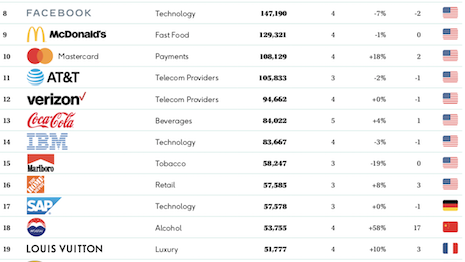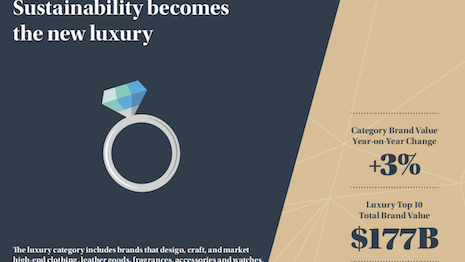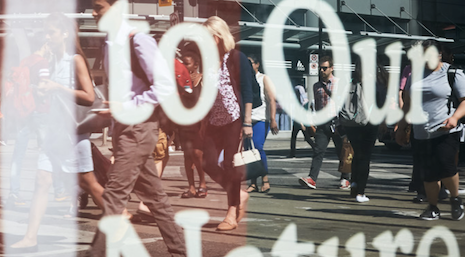- About
- Subscribe Now
- New York,
July 6, 2020

 Louis Vuitton broke the top 20 on Kantar’s BrandZ Top 100 Most Valuable Global Brands ranking list. Source: Kantar
Louis Vuitton broke the top 20 on Kantar’s BrandZ Top 100 Most Valuable Global Brands ranking list. Source: Kantar
Louis Vuitton, Chanel, Hermès, Mercedes-Benz, BMW and Gucci were among the world’s most valuable global brands this year.
Digital innovation, brand experience, brand as a service, sustainability and creativity are factors that help to propel brands to increase their brand value among consumers, according to a new report from Kantar, WPP’s global data, research, consulting and analytics business.
“Looking at the growth drivers, these household names are highly trusted and desired by consumers in Asia, which is now the fastest-growing region for these luxury brands,” said Elspeth Cheung, Global BrandZ valuation director at Kantar, London.
“It’s also the timelessness and quality that allow these luxury brands to be sought after in the post lockdown-world, regardless of the economic uncertainties,” she said.
 Sustainability is the new luxury, per Kantar’s BrandZ Top 100 Most Valuable Global Brands report. Image courtesy of Kantar
Sustainability is the new luxury, per Kantar’s BrandZ Top 100 Most Valuable Global Brands report. Image courtesy of Kantar
Notable ranks
Louis Vuitton ranked at No. 19, Chanel at No. 34, Hermès at No. 39, Gucci at No. 49, Mercedes-Benz at No. 56, BMW at No. 61, according to Kantar’s BrandZ Top 100 Most Valuable Global Brands ranking list.
Louis Vuitton made the Top 20 list this year for the first time, with a brand value of $51.8 billion, representing a 10 percent increase this year.
“LVMH was one of the first companies in the West to react to the fight against COVID-19 by using their manufacturing facilities to produce hand sanitizers for hospitals in France,” Ms. Cheung said.
“A lot of other brands followed suit later to be more socially responsible,” she said. “Yet, being a first-mover is what makes LVMH a leader in an industry that wins by setting the trend, taking initiative and being creative.
“As a result, we see in our BrandZ research that the LVMH family of brands like Louis Vuitton enjoys a high score in reputation and responsibility.”
Hermès’ brand value was up 7 percent this year. Gucci’s was up 8 percent.
Meanwhile, Chanel slipped 2 percent. Mercedes-Benz dropped 9 percent and BMW saw its brand value drop by 12 percent.
The luxury category’s brand value has grown 3 percent over last year to $177 billion in brand value, driven by service and sustainability.
Louis Vuitton, Chanel, Hermès, Gucci and Rolex were the top five on the list, followed by Cartier, Dior, Saint-Laurent/Yves Saint-Laurent, Burberry and Prada, who rounded out the top 10.
While these companies cater to exclusive occasions, these companies produced more practical luxury items to meet the needs of consumers’ everyday lives this year and their brand heritage resonated in this contemporary approach.
“Products displayed logos, but the intended message varied,” the BrandZ report said. “Some people used logos not to flaunt wealth—this is what I can afford—but rather to express individuality—this is who I am. The sharing economy expanded access to luxury with options more affordable than ownership. At the same time, up-leveling continued as people aspired to reach the next standard of luxury.”
Sustainability is considered a must among the younger consumers interviewed for the report, who expect the luxury products to be made with sustainable materials and less packaging. Luxury brands introduced new ways for consumers to obtain luxury products without owning them as a way to be more sustainable.
This includes adopting the rental model such as Bloomingdale’s subscription service, myList. Additionally, London department store Selfridges even opened a second-hand clothing department in partnership with a resale Web site.
Notably, TikTok joined the list for the first time. The Chinese social network has been attracting more luxury brands who have been creating challenges to help connect with consumers in Asia and increasingly in the West, where people are beginning to use the network.
“The content is fun, original and could put a smile on your face," Ms. Cheung said.
"Luxury brands are, in fact, very good at adopting these social media tools to create this ‘see it, want it, buy it’ behavior – and this is especially prominent when digital means are the only way to connect to the world as we become less mobile,” she said.
 The brand value of brand on the BrandZ Top 100 list reached $5 trillion i and $277 billion in additional brand growth. Image courtesy of Kantar
The brand value of brand on the BrandZ Top 100 list reached $5 trillion i and $277 billion in additional brand growth. Image courtesy of Kantar
Outlook
Investment in marketing and brand-building is critical for business recovery post-COVID-19.
As brands continue to navigate the murky waters of an uncertain economy, innovation and creativity are key drivers of growth among those on the BrandZ Top 100 list. These companies reached $5 trillion in brand value and $277 billion in additional brand value growth by adopting such values.
“The ability to engage consumers digitally is the key to navigate the current state of the world,” Ms. Cheung said.
“During the global lockdown, Kantar observed that consumers, especially the younger generation, are particularly engaged in short-form video entertainment like Instagram and TikTok,” she said.
Share your thoughts. Click here